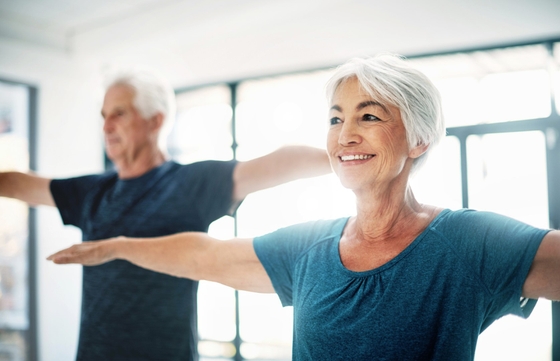
Get started with more physical activity
Finding time for physical activity is one of the best things you can do for your heart
Key takeaways
- Regular physical activity, such as walking, swimming, running or jogging, boosts heart health and overall well-being
- Aim for at least 30 minutes of moderate-intensity physical activity every day
- Start with small goals, such as a walk down to the end of your street and build it gradually
Most Australians are not doing enough physical activity for a healthy heart. When you feel rushed and tired, being active may be one of the first things you let slide. But finding time for physical activity is one of the best things you can do for your heart and overall well-being. It can give you more energy and better health for the long term.
What is physical activity?
Physical activity is any structured or non-structured movement you do every day. It can be anything from doing housework to activities you enjoy, such as walking around your local park, or to the shops, taking a post-dinner stroll and gardening. It also includes exercise and other structured activities like sport or gym classes.
How much physical activity do you need?
The physical activity recommendations for adults are:
- Do 30 minutes or more of moderate-intensity physical activity five or more days per week
- Be active on all or most days of the week, with some muscle-strengthening activities on at least two days each week.
The good news is you don’t need to start a new activity program at these levels. You can start with as little as walking 10 minutes a day and build your way up gradually.
How can you make physical activity part of your life?
Be realistic and set your own pace
- Focus on small, realistic goals (e.g. 10-minute walk at lunchtime)
- Make sure you schedule a time for walking and do it at a comfortable pace
- Take it slowly at first. It’s important not to do too much too soon, as you could lose motivation or give up
- Increase the frequency, duration and speed of the physical activity gradually
- Set one ambitious goal. This may be a charity walk some months away, reaching 10,000 steps or going on a day hike.
Make the process as enjoyable as possible
- Make sure you do activities you enjoy so you’re more likely to keep it up
- Change up your routine. Try tai chi or yoga, explore new routes or bring a friend along
- Get out with friends, family, your partner, a group or a neighbour. That way you motivate each other and have fun socialising while you’re at it
- Consider joining a Heart Foundation walking group. They’re located across Australia and have some members of all ages – even well into their 80s and older
Be prepared
- Dress for the weather. Be sun smart, take water with you and rest in shady areas. Or choose a more comfortable time of day to get active
- Stay safe. If you’re doing exercise at night or early in the morning, go with a friend and stick to well-lit areas. If you’re using an audio device, keep the volume low so you can also be aware of traffic and your surroundings.
Talk to your doctor
You should talk to your doctor about plans to boost your physical activity if you:
- Have a heart condition or suspect you might
- Have another medical condition that restricts your activity
- Get chest pain when active
- Have dizzy spells or often faint
- Feel breathless after doing moderate-intensity activity
- Smoke
- Are overweight
- Have high cholesterol or high blood pressure.
- Have felt your heart beating too fast or irregularly.
If you’re experiencing any of these symptoms, ask your doctor for a Heart Health Check before increasing your physical activity.
Why should you start walking?
Putting one foot in front of the other is the easiest path to better heart health. Walking has plenty of benefits, including that it’s:
- Fun, free and you don’t need any special equipment
- A great cardiovascular and muscular-skeletal workout. It can also help reduce stress, increase your alertness and improve your overall health
- Suitable for people of just about any age and fitness level
- Low-impact (which is better for your joints).
Get started with walking
Add more physical activity into your day by walking today. Download a free 6-week Personal Walking Plan or join a Heart Foundation walking group. Some Heart Foundation walking groups are dog-friendly and have members who bring along their children in prams or on bikes.
You might also be interested in...

Types of physical activity
Nine out of 10 Australians could reduce the risk of heart disease by walking as little as 15 minutes more each day.

Physical activity and your heart health
Physical activity and exercise can benefit your heart, body and mind.

Benefits of physical activity for your heart
Physical activity and exercise can do wonders for your physical and mental health.
Last updated04 February 2025
Last reviewed10 December 2024
